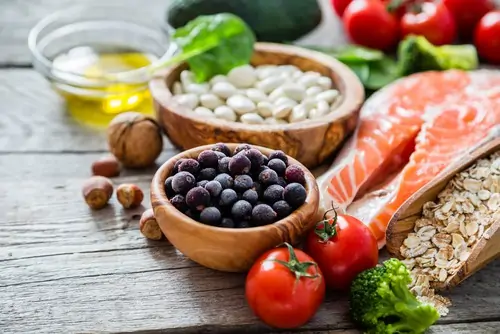
Even though your dentist in Clyde is all about keeping your mouth healthy, the truth is, proper nutrition and good oral health go hand-in-hand. This is why, during this National Nutrition Month, we want to do our part to raise awareness of the importance of eating right.
On A Nutrition Mission
When it comes to nutrition and eating healthy, it can seem simple from the surface — don’t eat too much sugar, eat your vegetables, limit fast foods. But when taking a deeper look into what the experts recommend, it can get pretty complicated. After all, even the United States Department of Agriculture (USDA) changed their recommendations twice since the Food Guide Pyramid was created in 1992. But healthcare professionals across the country, from dietitians to your dentist in Clyde, are on a mission to make nutrition easier to understand.
The truth is, not all of us need the same things in the same quantities. Like many things, nutrition is individualized and is based on a number of factors such as age, gender, height, weight, activity level, and underlying health concerns. The best way to find out your nutritional needs is to go to MyPlate and customize the best mix of dietary recommendations for you.
Eat Well, Smile Happy
We all know that what we eat can affect our overall health and either increase or decrease our risk for certain diseases and health concerns. But your dentist in Clyde wants you to know that what you eat also affects your oral health. In fact, many of the types of foods that can negatively affect our overall health can do the same for our teeth and include:
Foods or drinks that contain a lot of sugar, are high in carbs or fats, and foods and drinks that are acidic can damage tooth enamel and leave teeth exposed and at risk for decay.
The Hidden Sugar Effect
Many patients know that your dentist in Clyde will caution people about the risks of sugary foods. However, a lot of us aren’t aware of why your dentist may also tell you to take it easy on the carbs. Even though high-carb foods don’t taste sweet, they have something called “the hidden sugar effect” which breaks carbs down into simple sugars and can affect your teeth in a similar way as sugar-packed sweets.
Foods For Teeth
When you’re planning your meals and snacks based on your MyPlate results, don’t forget to choose some foods that can help keep your teeth strong and decay-free. Some foods for teeth include:
During this National Nutrition Month, find your ideal balance of the major food groups and try to fit your individual recommendations in each and every day. Eating a well-balanced diet can go a long way in helping your body, and your mouth, stay healthy.
Even though your dentist in Clyde is all about keeping your mouth healthy, the truth is, proper nutrition and good oral health go hand-in-hand. This is why, during this National Nutrition Month, we want to do our part to raise awareness of the importance of eating right.
On A Nutrition Mission
When it comes to nutrition and eating healthy, it can seem simple from the surface — don’t eat too much sugar, eat your vegetables, limit fast foods. But when taking a deeper look into what the experts recommend, it can get pretty complicated. After all, even the United States Department of Agriculture (USDA) changed their recommendations twice since the Food Guide Pyramid was created in 1992. But healthcare professionals across the country, from dietitians to your dentist in Clyde, are on a mission to make nutrition easier to understand.
The truth is, not all of us need the same things in the same quantities. Like many things, nutrition is individualized and is based on a number of factors such as age, gender, height, weight, activity level, and underlying health concerns. The best way to find out your nutritional needs is to go to MyPlate and customize the best mix of dietary recommendations for you.
Eat Well, Smile Happy
We all know that what we eat can affect our overall health and either increase or decrease our risk for certain diseases and health concerns. But your dentist in Clyde wants you to know that what you eat also affects your oral health. In fact, many of the types of foods that can negatively affect our overall health can do the same for our teeth and include:
Foods or drinks that contain a lot of sugar, are high in carbs or fats, and foods and drinks that are acidic can damage tooth enamel and leave teeth exposed and at risk for decay.
The Hidden Sugar Effect
Many patients know that your dentist in Clyde will caution people about the risks of sugary foods. However, a lot of us aren’t aware of why your dentist may also tell you to take it easy on the carbs. Even though high-carb foods don’t taste sweet, they have something called “the hidden sugar effect” which breaks carbs down into simple sugars and can affect your teeth in a similar way as sugar-packed sweets.
Foods For Teeth
When you’re planning your meals and snacks based on your MyPlate results, don’t forget to choose some foods that can help keep your teeth strong and decay-free. Some foods for teeth include:
During this National Nutrition Month, find your ideal balance of the major food groups and try to fit your individual recommendations in each and every day. Eating a well-balanced diet can go a long way in helping your body, and your mouth, stay healthy.